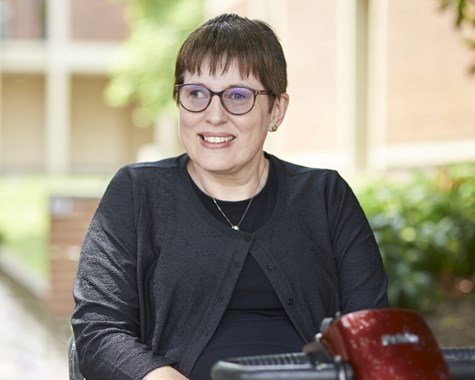Posted30 Aug 2023
- In
A Pennsylvania institution echoes the story of 10 Days
When I first read the story 10 Days in a Madhouse, I was drawn in. What grabbed my attention immediately was a similarity between the conditions described inside the Blackwell's Island asylum and those described inside Pennhurst State School and Hospital.
Pennhurst was an institution for people with intellectual and developmental disabilities operated by the state of Pennsylvania from 1908 - 1987. It is located about 30 miles from Philadelphia in a rural part of Chester County, Pennsylvania. When it opened, Pennhurst was considered a model facility to meet the needs of people with disabilities. However, problems quickly arose including overcrowding, inadequate staffing, and the use of Pennhurst as a place to confine anyone society did not seem to accept. In addition to those with intellectual disabilities, this included people who were poor or homeless, those who experienced mental illness, and those who may have been convicted of crimes.
Throughout its history, more than 10,000 people lived at Pennhurst, people both with and without disabilities. People in positions of authority had the power to send people to Pennhurst. Many times, it was a male physician who told a mother, just trying to do her best by her child, that Pennhurst was the only place for her child. Other times it was a male judge who decided that someone should be sent to live at Pennhurst. It quickly became a dumping ground for anyone society could not seem to manage.

I learned about Pennhurst in my role as the Associate Director of Policy at the Institute on Disabilities at Temple University. It reminded me of a friend of mine describing what it was like living in a group home for women with disabilities. “We didn’t have the power,” she said. “We took our power when we got our voice.”
I thought of mothers I know in the disability rights movement, mothers who met in kitchens and created school classrooms in their basements so that their disabled children could access meaningful education. Government officials told them they were too loud. They told them they were “making a reputation for themselves all over this state.” Yet, they refused to quit until their voices were heard. This is where they found power.
In Nellie Bly’s account of the asylum on Blackwell’s Island, Ten Days in a Mad-House, those who are “less desirable” are hidden away. Decisions about what is “socially desirable” are made and controlled by men. In many instances women who were immigrants, poor, unwed, or homeless found themselves admitted to the asylum on Blackwell’s Island. They were not insane – quite to the contrary, they were often non-conformists.
Perhaps men saw them as a threat. Perhaps men did not wish to be bothered by these women who refused to “conform” to the traditional roles that men expected of them in a civilized society.
Regardless of the reason, the women in 10 Days searched for a way to take back their power. Their path to power, to telling their stories of abuse and confinement in front of a Grand Jury, came from the work and support of one brave female journalist – Nellie Bly.
It seems fitting that the opera 10 Days in a Madhouse should premiere in Pennsylvania. Not just because it is Nellie’s home state (she was born Elizabeth Jane Cochran in a small town outside Pittsburgh), but also because Pennsylvania’s history is rich with both public and private institutions such as Pennhurst. Some of these institutions remain operational even in 2023.
I am a woman who was born with cerebral palsy, a developmental disability. Born in 1973, it is not lost on me that –

- My mother was encouraged (but didn’t listen) to place me in a segregated preschool.
- As a child with a disability, I had no right to education in an inclusive setting. Equal educational access for children with disabilities was not available until passage of the Education for All Handicapped Children Act in 1975.
- When Pennhurst finally closed in 1987, I was a young teen.
- When I was 16 years old, a male high school guidance counselor looked at me and said, “getting a law degree is a lofty goal for someone like you.”
- As a young attorney, male attorneys and Judges often assumed that I was the client or the legal secretary.
I bring these experiences with me to the opera. Nellie Bly and this story resonate with me because Nellie was not afraid to bring all of herself to her work as a journalist. I am grateful that she was brave enough to insist that an editor meet her where her identity as a journalist and her identity as a woman would intersect. If not for her, the women on the island would likely not have found their voices and their power.
Intersectionality, by definition “describes the ways in which systems of inequality based on gender, race, ethnicity, sexual orientation, gender identity, disability, class, and other forms of discrimination ‘intersect’ to create unique dynamics and effects.” For me, intersectionality is important because it recognizes that being a woman is part of who I am and that having cerebral palsy is also part of who I am. Intersectionality makes space for all of this. It doesn’t force me to choose. It doesn’t ask me to hide any part of me because of the expectations of others. Holding space for intersectionality invites inclusion.
As I view 10 Days, I listen, and watch and learn as both a woman and a person with a disability. I get to bring all of me to the theater, and that is empowering. I invite you to bring all of you as well.
Continue the Conversation
Join me on Tuesday, September 26th for a one-hour panel discussion and Q&A session following the performance of 10 Days in a Madhouse. This will be a great opportunity to learn more about disability justice and how Nellie Bly’s work inspires and resonates in our current times.
Explore Disability Justice Resources
“Plain language” is a way of writing to help the reader understand quickly and easily what is being communicated. It is important to me because it promotes inclusion of all people. From a disability justice perspective, focusing on plain language helps to avoid use of jargon, acronyms, or other language that may be ableist. Read my plain language synopsis for 10 Days in a Madhouse.
Familiarize yourself with key events from the history of institutionalization in the State of Pennsylvania.
On Blackwell's Island, women, including women with mental illness and other disabilities, were excluded from Society because they were different. They stood out and did not conform to the expectations of the male dominated society of the mid 19th-century. Similar to the experience of these women, people with intellectual and developmental disabilities, as well as epilepsy were also warehoused in the "asylum" on Blackwell's Island.* While the institutions on Blackwell's Island eventually closed, institutionalization of people with disabilities continued. In this interview, George Shands remembers his time living in Embryville State Hospital, and his letter to Pennsylvania's then Governor which eventually resulted in his release. George now lives a self-determined life in his Philadelphia community. He is a successful entrepreneur. His self-advocacy and desire to live the life of his choosing with home and community-based support is an example of disability justice in action.
*Horn, Stacy, "Damnation Island - Poor, Sick, Mad & Criminal in 19th Century New York" (25-26) (2019)
File/Life is a “community-led, creative exploration of the Pennhurst archives”. It promotes disability justice by giving voice to people whose stories would otherwise go untold. Some of the stories explore the unique intersections of gender and disability. Many of the women who lived at Pennhurst were treated differently and confined longer than male residents, to ensure that they did not have children.
“Visionary Voices” is a project of the Institute on Disabilities at Temple University. The project uses personal stories to share some of the history of the Pennsylvania intellectual and developmental disability rights movement. I invite you to think about this history as you experience 10 Days in a Madhouse or participate in our Roundtable Discussion. Many of the stories are shared by mothers, caregivers and other powerful women who shaped the deinstitutionalization movement in Pennsylvania. These women are leaders who continue to promote inclusion and civil rights. There's a lot to explore within Visionary Voices, but I might recommend the following:
About Jamie Ray-Leonetti
Ms. Ray-Leonetti is the Associate Director of Policy, responsible for coordinating all policy-related activities for the Institute on Disabilities at Temple University. She also works on other grants and contracts related to public policy, such as the implementation of the CMS Final Rule for Home and Community-based Services, and the Person-Direct Services project. Before joining the Institute, Ms. Ray-Leonetti spent the first 20 years of her professional career advocating for individuals with disabilities throughout Pennsylvania. She has a BA in Humanities from York College of Pennsylvania and a JD from Temple University School of Law. She is currently pursuing a graduate certificate in Disability Studies from Temple University with a fieldwork placement at Opera Philadelphia.
In her spare time, Jamie enjoys singing and traveling with her husband Frank. She is a volunteer with the National MS Society and Lawyers Concerned for Lawyers Pennsylvania. Jamie identifies as a proud member of the disability community.
Leave your comment below.

 Facebook
Facebook Twitter
Twitter More
More